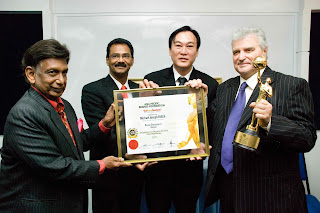Recently, the LCCH presented an experiential one-day workshop entitled Pain Management Through Clinical Hypnosis at the inaugural collaborative conference held by the Association of Family Practitioners of Malaysia (AFPM) and the Royal Australian College of General Practitioners (RACGP). This oversubscribed workshop proved extremely popular to the 110 enthusiastic healthcare professionals who travelled from all over the world to attend. LCCH CEO and Director of Studies, Peter Mabbutt, introduced delegates to hypnotherapy and to the role that it has to play in the management of pain. Throughout the day many sceptics became ardent advocates of hypnotherapy as they came to the realisation that it can help improve patient care in their very busy medical practices. Delegates were awarded CPD points for attending the workshop.
 |
| Delegates at the Pain Management Through Clinical Hypnosis Workshop |
The LCCH is pleased to announce that this popular workshop is once again going to be held in London on the 26th February 2011.
It is open to all healthcare professionals, therapists and professionals from other disciplines working in the field of pain management who wish to learn how hypnotherapy can be used to augment and enhance pain management.
 |
| A Demonstration of Glove Analgesia |
With its hands-on approach delegates will both learn and experience basic hypnotic induction and deepening techniques along with common hypnotherapeutic approaches to pain management.
 |
| Practicing Glove Analgesia |
Undoubtedly psychological factors are an important aspect of pain management that affect a person’s pain threshold. These are explored from the hypnotherapeutic perspective, as is the concept of secondary gain that can hinder effective pain management.
 |
| Delegates Practicing Self-hypnosis |
The AFPM/RACGP conference and workshop afforded a great opportunity for the LCCH to introduce hypnotherapy to the many key players in medicine who were in attendance from the Asia-Pacific region. These included the Director General of the Malaysian Department of Health (the equivalent of the Minister for Health in the UK) and both heads of the AFPM and the RACGP, all of whom were enthusiastic in expressing a wish to work with the LCCH in expanding public awareness of hypnotherapy.
For further details of the workshop telephone the LCCH on 020 7402 9037 or email info@lcch.co.uk
www.lcch.co.uk
www.lcch.co.uk






